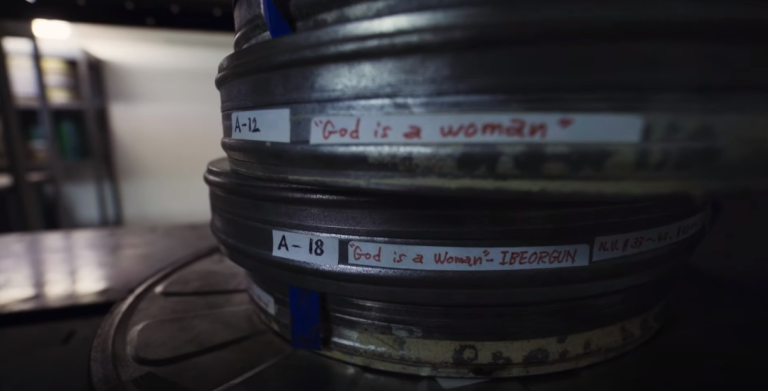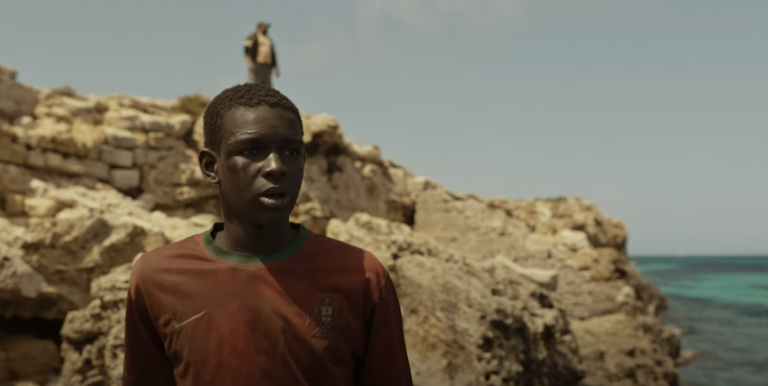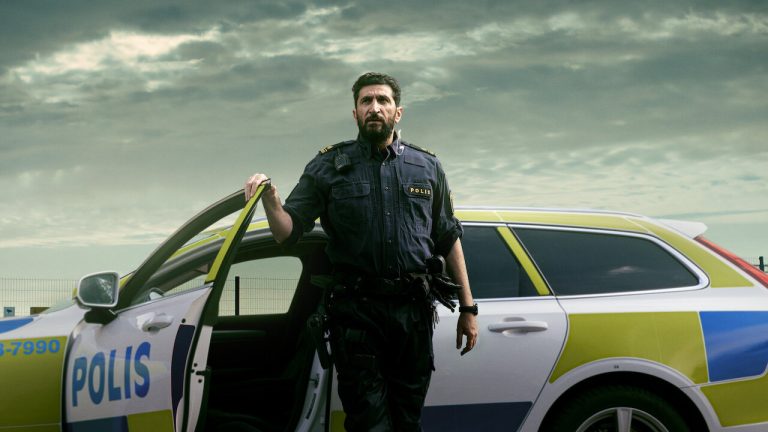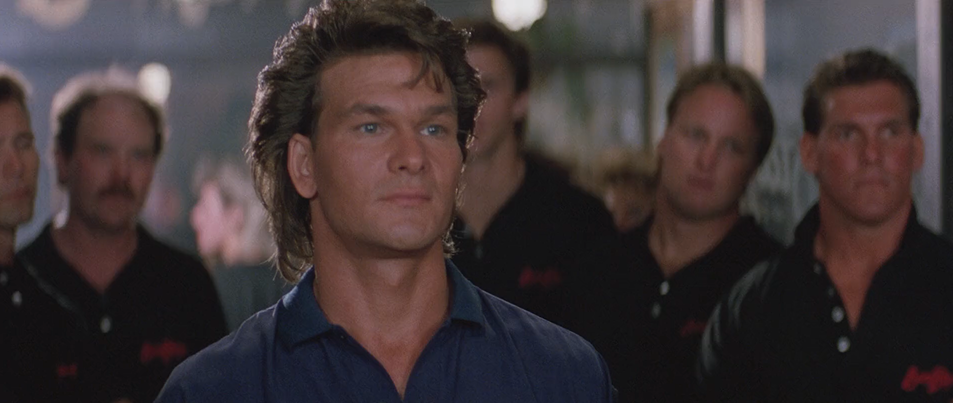
Overview
“Road House” (1989) is a cult classic action film directed by Rowdy Herrington. Set in a small town in Missouri, the story follows Dalton (Patrick Swayze), a professional bouncer with a mysterious past, who is hired to clean up the rough Double Deuce bar. Dalton quickly realizes that the town is under the control of corrupt businessman Brad Wesley (Ben Gazzara), who resorts to violence and intimidation to maintain his power.
As Dalton works to restore order to the bar, he becomes embroiled in a conflict with Wesley and his thugs, leading to intense confrontations and thrilling action sequences. Along the way, Dalton forms a romantic connection with a local doctor named Elizabeth (Kelly Lynch), adding depth to his character.
“Road House” is known for its over-the-top action, memorable one-liners, and Swayze’s charismatic performance as the stoic but skilled bouncer. The film has gained a cult following for its entertaining blend of action and melodrama, making it a beloved entry in the action genre. With its mix of barroom brawls, romance, and revenge, “Road House” remains a beloved cult classic cherished by fans of 80s action cinema.
| Title | Road House |
|---|---|
| Director | Rowdy Herrington |
| Main Cast | Patrick Swayze, Kelly Lynch, Ben Gazzara |
| Genre | Action, Thriller, Drama |
| Setting | Small town in Missouri |
| Plot | Professional bouncer hired to clean up a rough bar clashes with corrupt businessman and his thugs |
| Themes | Redemption, Revenge, Corruption |
| Reception | Cult classic, Known for over-the-top action and memorable one-liners |
| Legacy | Cherished by fans of 80s action cinema, Gained a cult following |
Plot of the Movie
James Dalton, a seasoned bouncer grappling with a violent past, is hired by businessman Frank Tilghman to oversee security at the Double Deuce, a troubled club in Jasper, Missouri. Tilghman seeks Dalton’s expertise to address the venue’s rampant disorderliness and unruly patrons. Dalton accepts the offer under the condition of complete autonomy, promptly dismissing several staff members for misconduct. He opts for seclusion in a barn owned by farmer Emmett, oblivious to the nearby estate of Brad Wesley, a notorious crime figure dominating the town through illicit means. As Dalton settles into his new role, tensions escalate with Wesley’s nephew and Dalton’s former colleagues, leading to a confrontation that threatens the club’s stability.

Pat, who was among the dismissed employees, coerces Tilghman into rehiring him before launching an assault on Dalton, resulting in Pat and his associates sustaining severe injuries inflicted by Dalton. Despite being wounded himself, Dalton seeks medical attention and forms a bond with Dr. Elizabeth Clay, with whom Wesley also shares an interest. Wesley’s attempts to disrupt operations at the Double Deuce fail, prompting him to offer Dalton a job, which Dalton declines. In retaliation, Wesley leverages his influence to block the club’s access to alcohol suppliers. Undeterred, Dalton procures supplies through his own contacts and reunites with his mentor, Wade Garrett, who arrives following a troubling message from Dalton. Wesley dispatches his men to sabotage the Double Deuce’s supplies, but Dalton and Garrett emerge victorious in their confrontation.

One night, the neighboring auto shop belonging to Elizabeth’s uncle, Red Webster, is set ablaze in an act of arson. Upon returning to the Double Deuce, Dalton and the patrons are confronted by Wesley, who instigates a brawl between his men and Dalton’s bouncers, causing havoc inside the bar. Despite their efforts, Wesley agrees to leave, leaving destruction in his wake. As the community laments their inability to thwart Wesley’s reign of terror, Garrett attempts to console Dalton, addressing his internal struggles over past violence and frustration with Wesley’s tyranny. Elizabeth also pleads with Dalton to reconsider his involvement, but their conversation is interrupted by an attack on Emmett’s home by Wesley’s henchman, Jimmy Reno. In a fit of rage, Dalton engages in a brutal confrontation with Reno, ultimately killing him by ripping out his throat, shocking and repulsing Elizabeth.

Wesley subsequently contacts Dalton, issuing a chilling ultimatum: either Elizabeth or Garrett will meet their demise. Garrett survives an attack by Wesley’s men, while Dalton rushes to ensure Elizabeth’s safety, though she remains distant. Returning to the bar, Dalton discovers Garrett has been murdered, sending him into a vengeful frenzy. He storms Wesley’s compound, dispatching most of his henchmen, but refrains from killing Wesley himself, determined not to succumb to rage. Elizabeth arrives, reconciling with Dalton, just as Wesley attempts to shoot him. However, before Wesley can pull the trigger, he is fatally shot by locals, including Emmett and Red. Despite the presence of law enforcement, all witnesses claim ignorance of the events.
In the aftermath, the revitalized Double Deuce thrives with a modernized atmosphere, as Dalton and Elizabeth share a moment swimming in a nearby lake.
Reasons to Watch It
Reasons to watch ‘Road House’ include Patrick Swayze’s captivating performance, adrenaline-pumping action sequences, memorable one-liners, gritty cinematic style, dynamic characters, and its revered status as a cult classic in 1980s action cinema.

Patrick Swayze’s Performance – Patrick Swayze delivers a charismatic and memorable performance as James Dalton, the stoic and skilled bouncer with a troubled past. His portrayal adds depth and intensity to the character, making him a captivating protagonist. Action-Packed Sequences – The film is filled with adrenaline-pumping action sequences, including barroom brawls, intense fight scenes, and thrilling confrontations. These moments keep viewers engaged and entertained throughout the movie.

Memorable One-Liners – “Road House” is renowned for its memorable one-liners and quotable dialogue, adding a layer of humor and charm to the action-packed narrative. These lines have become iconic among fans of the film. Cinematic Style – Director Rowdy Herrington infuses the film with a gritty and stylized aesthetic, capturing the essence of the 1980s action genre. The cinematography and visual effects enhance the overall viewing experience, immersing audiences in the world of “Road House.”

Dynamic Characters – Alongside Swayze’s Dalton, the film features a diverse cast of characters, each with their own motivations and conflicts. From the menacing Brad Wesley to the strong-willed Dr. Elizabeth Clay, the characters contribute to the richness of the story. Cult Classic Status – “Road House” has achieved cult classic status since its release, garnering a dedicated fanbase and earning its place in the pantheon of 1980s action cinema. Watching it allows viewers to experience a beloved piece of cinematic history.

Overall, “Road House” promises an entertaining blend of action, drama, and memorable moments, making it a must-watch for fans of the genre and those seeking an enjoyable movie experience.
Reasons to Avoid It
Reasons to avoid watching “Road House” may include its exaggerated action and violence, clichéd elements typical of 80s action films, potential for offensive stereotypes, limited character depth, and a predictable plot that may not appeal to those seeking more nuanced storytelling.

Exaggerated Action and Violence – “Road House” is known for its over-the-top action sequences and violence, which may not be suitable for all viewers. The film features numerous barroom brawls and confrontations that border on being unrealistic and excessive, potentially turning away those who prefer more subdued or realistic portrayals of action. Clichéd Elements of 80s Action Films – As a product of its time, “Road House” contains several clichéd elements typical of 1980s action cinema, including formulaic plot structures, stereotypical characters, and predictable story beats. For viewers looking for fresh and innovative storytelling, these clichés may make the film less appealing.

Potentially Offensive Stereotypes – Like many action films from the era, “Road House” may contain outdated stereotypes or portrayals that could be considered offensive by contemporary standards. This includes depictions of certain characters based on gender, ethnicity, or profession, which may not align with modern sensibilities. Limited Depth in Character Development – While “Road House” offers entertaining characters, the depth of their development may be lacking compared to more character-driven films. Some viewers may find the characters to be one-dimensional or lacking in complexity, which can detract from the overall viewing experience.

Predictable Plot – The plot of “Road House” follows a relatively predictable trajectory, with few surprises or twists along the way. For viewers who prefer films with more unexpected turns or deeper thematic exploration, the straightforward nature of the plot may be a reason to avoid watching the movie.
Overall, while “Road House” has its merits as a cult classic in the action genre, its exaggerated action, clichéd elements, potential for offensive stereotypes, limited character development, and predictable plot may make it less appealing to certain audiences.
Critical Response
Upon its initial release, “Road House” encountered a largely negative critical reception, with many reviewers pointing out its formulaic plot, exaggerated action sequences, and stereotypical characters. Critics often criticized its reliance on clichés typical of 1980s action films, including the lone hero facing off against a corrupt antagonist and the use of gratuitous violence as a primary narrative driver. Additionally, some reviewers took issue with the film’s portrayal of certain characters, noting potential offensive stereotypes.
Despite the initial critical reception, “Road House” has since garnered a cult following among fans of action cinema. Over time, its campy charm, memorable one-liners, and Patrick Swayze’s charismatic performance have contributed to its status as a beloved cult classic. Viewers have come to appreciate the film’s entertainment value, embracing its over-the-top action and embracing its status as a quintessential example of 1980s cinematic excess. As a result, while critical opinions remain divided, “Road House” has found enduring popularity among audiences who revel in its nostalgic appeal and unabashedly fun approach to action filmmaking.

| Aspect | Initial Reception | Current Perception |
|---|---|---|
| Plot | Criticized for being formulaic and predictable | Appreciated for its nostalgic charm and entertainment value |
| Action Sequences | Seen as exaggerated and over-the-top | Embraced for its campy charm and adrenaline-pumping moments |
| Characters | Criticized for being stereotypical and lacking depth | Viewed as iconic and memorable, adding to the film’s charm |
| Cultural Impact | Received mixed to negative reviews initially | Gained a cult following over time, becoming a beloved classic |
| Overall Reception | Largely negative among critics | Enjoyed by audiences for its entertainment value and nostalgia |
Key Themes
Key themes in “Road House” include redemption through confronting past actions, the pursuit of justice in the face of corruption, struggles with identity and acceptance, the importance of community solidarity against oppression, and the exploration of romance amidst chaos and violence.

Redemption – Protagonist James Dalton seeks redemption for his violent past by using his skills as a bouncer to bring order to the chaotic Double Deuce bar and confront the corrupt forces in Jasper, Missouri. Justice – The film explores themes of justice as Dalton takes on the role of protector, standing up against the criminal activities of Brad Wesley and his henchmen to bring accountability to the town.

Power and Corruption – “Road House” delves into the abuse of power and corruption, as Brad Wesley wields his influence to control the town through bribery, intimidation, and violence, highlighting the imbalance of power and the struggle for autonomy. Identity and Acceptance – Dalton grapples with his own identity and past actions, seeking acceptance and redemption for his violent tendencies while also striving to maintain his principles and integrity in the face of adversity.
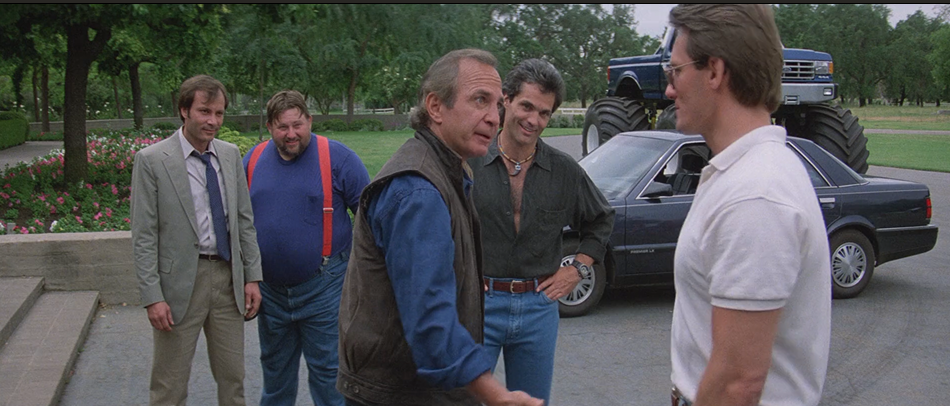
Community and Solidarity – As Dalton rallies the community to stand against Wesley’s tyranny, the film explores themes of community solidarity and collective action, emphasizing the importance of unity in the face of oppression. Romance and Relationships – The relationship between Dalton and Dr. Elizabeth Clay adds a romantic subplot to the film, exploring themes of love, trust, and connection amidst the chaos and violence of their surroundings.
Above-mentioned themes intertwine throughout the narrative of “Road House,” enriching the story and adding depth to its characters and conflicts.
Memorable Moments
Memorable moments in “Road House” include intense barroom brawls, iconic one-liners like “pain don’t hurt,” confrontations with antagonist Brad Wesley, the fiery destruction of Red’s Auto Shop, the shocking throat-ripping scene, and the climactic showdown at Wesley’s estate, showcasing the film’s action-packed nature and iconic moments.

Barroom Brawls – Throughout the film, there are numerous intense barroom brawls at the Double Deuce and other locations, showcasing Dalton’s exceptional fighting skills and the chaotic atmosphere of the establishments. These scenes are filled with broken bottles, flying fists, and dynamic choreography, adding to the film’s action-packed nature. Iconic One-Liners – “Road House” is known for its memorable one-liners, such as Dalton’s classic line, “pain don’t hurt.” These lines often punctuate intense moments or add a touch of humor to the action, becoming iconic quotes among fans of the film.

Confrontations with Brad Wesley – Dalton’s clashes with the corrupt antagonist Brad Wesley are pivotal moments in the film. These confrontations highlight the power struggle between Dalton, who seeks to bring justice to the town, and Wesley, who exerts control through intimidation and violence. Their interactions build tension and propel the narrative forward. Destruction of Red’s Auto Shop – The arson attack on Red’s Auto Shop, owned by Elizabeth’s uncle, is a significant turning point in the film. The destruction of the shop escalates the conflict between Dalton and Wesley, leading to further violence and retribution.

Throat-Ripping Scene – One of the most shocking moments in “Road House” occurs when Dalton, in a fit of rage, rips out the throat of Wesley’s henchman, Jimmy Reno. This brutal act demonstrates Dalton’s capacity for violence and serves as a visceral climax to the escalating tensions in the story. Climactic Showdown – The climactic showdown at Wesley’s estate is the culmination of the film’s narrative arc. Dalton confronts Wesley and his henchmen in a final battle, refusing to give in to his anger and seeking to end the cycle of violence. The resolution of this conflict marks a decisive moment of triumph for Dalton and the other characters involved.
These moments contribute to the enduring popularity of “Road House” and have solidified its status as a beloved cult classic in the action genre.
Streaming Platforms
Road House” can be streamed on platforms like Amazon Prime Video, iTunes, Google Play Movies & TV, YouTube Movies, Vudu, Hulu, Netflix, and HBO Max, subject to regional availability.
You can rent or purchase “Road House” for streaming on Amazon Prime Video. “Road House” is likely available for rent or purchase on the iTunes Store, which can be accessed through Apple TV. Similar to iTunes, you can rent or purchase “Road House” for streaming on Google Play Movies & TV. “Road House” might be available for rent or purchase on YouTube Movies.

Vudu is another platform where you can rent or purchase digital copies of “Road House” for streaming. Depending on your region, “Road House” may be available for streaming with a Hulu subscription. However, it’s worth checking the current catalog to confirm availability. While “Road House” has appeared on Netflix in the past, its availability may vary by region and time. Keep an eye on the Netflix catalog for updates. In some regions, “Road House” may be available for streaming on HBO Max as part of its rotating catalog of movies.
Before streaming, it’s advisable to check each platform’s current catalog or use a streaming search engine to verify the availability of “Road House” in your region.

